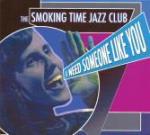
The Smoking Time Jazz Club has established itself as a regular at Maison and the Spotted Cat on Frenchmen Street and as a frequently seen street band in the Quarter.
In recent years the band has developed a characteristic style that is amply demonstrated on this latest CD. As we noted a year ago, Smoking Time can handily go an entire evening without playing anything that can be easily recognized, and singer Sarah Peterson “has a way with words to tunes that many of us never knew had lyrics.”
“Sunset Stomp” is the latest example of that on this current offering, a sprightly version of the Louis Armstrong Hot Five’s “Sunset Cafe Stomp.” The word “Cafe” was dropped evidently, because the lyrics just don’t scan that way. While the CD has a number of tunes that are identifiable but not necessarily familiar, the Club’s versions are anything but covers. “What A Little Moonlight Can Do” is a very nice interpretation of the Billie Holiday favorite. “Buddy’s Habit” may have a slide whistle part like the King Oliver Creole Jazz Band version but it is strictly a solo, not a trombone-whistle duet.
That would have been a bit difficult since Smoking Time’s trombonist, Colin Meyers, plays the slide whistle in this version. “Zombie” is a jungle-style riff tune that features some solid work by Reedman Dan Oestreicher on bass sax. He is also heard to good effect along with solos by all members of the rhythm section on “Ballin’ A Jack”, usually known as Ballin’ The Jack” which is not the familiar standard but a lesser known tune done originally by the Chicago Footwarmers, a quartet with Johnny Dodds on clarinet, Natty Dominique, trumpet, Jimmy Blythe, piano, and Jimmy Bertrand on washboard. Smoking Time rarely plays a set without doing at least one Jelly Roll Morton tune and that has also been true of their CDs.
In this case it is “Grandpa’s Spells,” always a pleasure to hear when played by musicians who know what they are doing. The title song “I Need Someone Like You” is a Fats Waller original, which Peterson handles with her usual aplomb. Then there’s a swing-era cut with a band chorus singing “Well All Right, Then,” a tune first made famous in versions by Tommy Dorsey and the Andrews Sisters during World War Two.
Bassist and arranger John Joyce tells me that the band’s name has nothing to do with tobacco or that other familiar weed. “Jazz Club” refers to the fact that when the band first began, they practiced regularly in a place that was a kind of clubhouse. And from the very beginning, he says, their goal was to see to it that both the band and its listeners had a “smoking hot time.”
So for once, at least, you can forget the Surgeon General’s warning, take a deep breath, sit back and relax while enjoying some music that really smokes.



